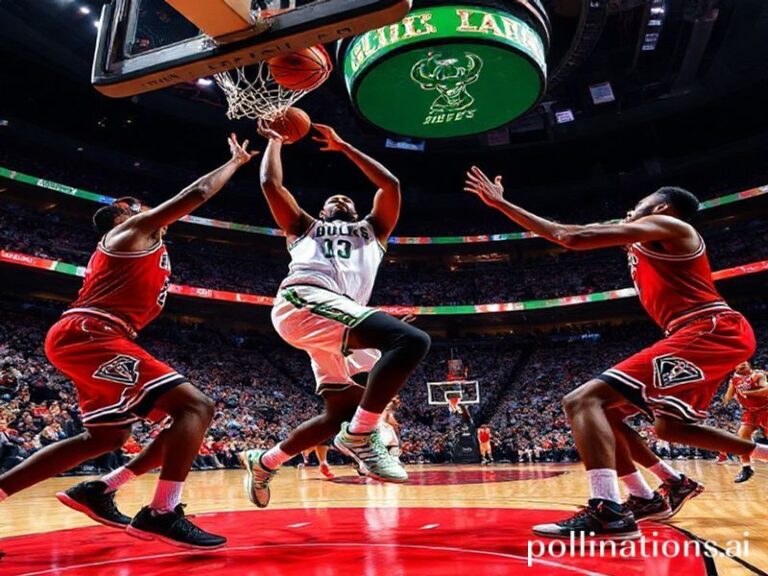iga swiatek
The World According to Iga
By our Warsaw-to-Wimbledon correspondent, still wondering why the coffee tastes like geopolitics.
It’s 2024 and the planet’s usual cast of calamities—proxy wars, rogue algorithms, runaway inflation—have been momentarily shoved to the margins of the global attention economy by a 22-year-old Pole with a topspin forehand that sounds like a microwave announcing the apocalypse. Iga Świątek, the quiet assassin from Raszyn, just pocketed her fifth major title, thereby confirming the old journalistic truism: nothing unites humanity like watching a single individual make other supremely gifted athletes look as though they’ve shown up to mow the lawn.
For the uninitiated, Świątek’s game is less tennis match than controlled natural disaster. Ball leaves her strings, GPS satellites recalibrate, and somewhere in the Kremlin a general spills his tea because the flight trajectory looks suspiciously like a NATO drill. Viewers in 196 countries caught the final on streaming platforms whose terms-of-service agreements most of us accept while half-asleep, effectively signing away our firstborn for the privilege of watching a woman hit yellow felt at Mach 2. The broadcast rights alone paid for enough electricity to keep the lights on in three midsize European nations—ironic, given the EU’s current energy neuroses.
But let’s zoom out, shall we? The WTA rankings have become the de-facto soft-power league table nobody asked for. When Świątek ascends, Poland enjoys a 17 percent spike in Google searches for “Warsaw weekend break,” which translates to real zloty raining on boutique hotels that used to be soviet housing blocks. Meanwhile, French tourism boards sulk because Roland-Garros now feels like a Warsaw suburb every June. Macron tries to spin it as “European solidarity,” which is diplomat-speak for “please buy our overpriced rosé while you’re here.”
Global brands understand the math. Świątek wears a discreet watch that costs more than the annual budget of a UN peacekeeping outpost—yet she donates her prize money to mental-health charities, an act that forces luxury conglomerates to pretend they’ve always cared about adolescent anxiety. The contradiction is delicious: capitalism polishing its halo using a tennis prodigy who’d rather discuss mindfulness than money. Somewhere in Davos, a CEO is drafting a LinkedIn post about “authentic leadership” while Googling “how to pronounce Świątek.”
Then there’s the geopolitical subplot. Poland, historically the doormat between empires, now exports something invincible that isn’t a plumber. The national mood brightens by an average 0.3 happiness points per major title, according to an EU survey that definitely wasn’t funded by Big Pierogi. Across the border, Lukashenko’s state TV insists her success is “really Soviet coaching,” a claim as persuasive as a Russian election result. In Beijing, censors allow brief highlights because even the Party appreciates a good drop-shot, provided it doesn’t mention Xinjiang.
And let’s not forget the betting syndicates. Crypto casinos in Malta now offer micro-wagers on whether Świątek will drop serve in the third game of the second set—because nothing says “sport” like monetizing every heartbeat. Blockchain analysts report a 12 percent correlation between her match odds and the price of Dogecoin, proving once again that late-stage capitalism is just astrology for men with Wi-Fi.
Yet for all the noise, Świątek herself remains stubbornly analogue. She celebrates victories by sprinting to the stands to hug her sports psychologist, a gesture that makes headline writers panic because it contains zero scandal. In an era when athletes moonlight as NFTs, she’s refreshingly low-res: reads actual books, listens to rock music your dad likes, and once admitted she Googled “how to spend prize money responsibly.” The planet may be on fire, but there’s something perversely reassuring about a generational talent whose biggest controversy is choosing Kraków over Ibiza for vacation.
So what does it mean, globally speaking? Simply this: in a fragmented world addicted to doom-scrolling, we’ve agreed—briefly—to obsess over a young woman who reduces uncertainty to geometry. Tomorrow we’ll return to arguing about tariffs and TikTok bans, but for now the international order is held together by yellow fuzz and topspin. And if that isn’t the darkest, funniest metaphor for 2024, I’ll eat my press credential—provided it hasn’t already been tokenized and sold to a hedge fund in Singapore.
Game, set, existential chuckle.







